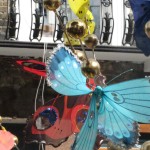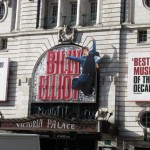The Notting Hill Carnival was not what I expected, but at the same time did meet some of my expectations. The ones it met: the drinking/party atmosphere (it also exceeded this one by a lot) and excellent food. The parade disappointed me; I was expecting more cultural representation and differentiation. Instead, I found it to be lacking. My initial reaction was, “Okay. This is different, but cool.” By the third “float,” however, I found them to redundant. The costumes were gorgeous, but some of the marchers should have rethought their costume decisions. Coming from a family that loves parades- we watch every Thanksgiving Day & Rose Bowl parade together- I was expecting different floats, all intricately designed and reflective of the culture of the community who put that float together. Instead, it was mostly people in sequined and glittery costumes walking behind a big truck (or double decker bus) that was playing loud music- some of which was American. I was hoping for a cultural learning experience, not a chaotic drinking party in the middle of the day posing as a cultural experience. Setting aside the drunkard-dodging and remixed American music, I enjoyed the carnival for the experience it offered; it was definitely a chance to observe the English in what Fox referred to as a “liminal” space. In different ways, I felt that people were more relaxed and open to just enjoying the experience. The typical English reserve seemed to be greatly diminished (among the sober and definitely not sober). It was a great overall experience, but I don’t think I would go to the Carnival in the future.
Billy Elliot, however, exceeded all of my expectations. It is something I wanted to see while I was here, but I never expected it to tie Wicked for my favourite musical. (Note: I’m a bit obsessed with Wicked. You probably don’t want to mention it in a 10 foot radius of me if you don’t want to get into a lengthy discussion.) About a young boy who discovers that he is a talented dancer and decides he wants to dance for life, the story concentrates on several of the topics we have (or will) discuss will discuss in class, including labor strikes, class, and the government. Throughout the entire musical, class is an issue. For the miners in Billy’s community, dancing isn’t something done. A male dancer is a “poof” not to be taken seriously. A career as a miner and providing a steady income for one’s family is the most respectable option. Billy’s dad is dead set against Billy dancing, but when he realizes he is so talented and can’t help but dance, he decides to go back to work in the mines. (They’ve been in the middle of a mining strike.) Breaking the strike drives a wedge between him and his older son, Tony. The representation of community in the musical, especially among the miners despite their hardship, is an excellent example of the way our readings have mentioned communities coming together. Furthermore, seeing this community on throughout their strike adds a human dimension that our readings could not express. It brought the stats to life for me, which is something that I normally look to art to do. The musical also touches on Thatcher’s government & the way that it reacted to the strike to break it. (“Merry Christmas Maggie Thatcher” had to be one of the most hilarious and poignant scenes in the entire musical, giving an excellent representation of how elitist that government seemed.) I could go on forever on the way that it relates to class. It’s an excellent musical that I think everyone should see. There is something for everyone in it, especially as we all consider the diversity of London, the struggles of labor, and the English class system.


